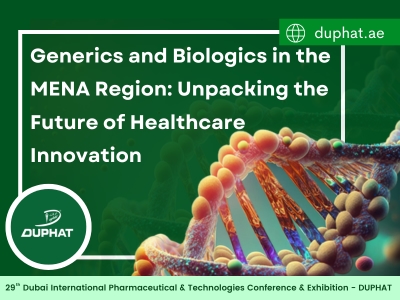
The pharmaceutical landscape in the MENA region is rapidly evolving with a growing focus on both generics and biologics. Generics are affordable medicines equivalent to branded drugs in terms of dosage and efficacy but come at substantially lower prices after patents expire. These medications are crucial for broadening healthcare access across socioeconomic classes. Contrastingly, biologics are sophisticated treatments derived from living entities designed for complex diseases like cancer and autoimmune disorders. Biosimilars, which are highly similar and economical versions of biologics, are increasingly integrated into the healthcare system. This dual approach balances cost-effective, wide-reaching care via generics with specialized treatments delivered by biologics. Such advancements and discussions are highlighted at the Pharma Conference Dubai.
The region’s pharmaceutical market is witnessing robust growth due to health reforms, rising patient needs, and innovations in manufacturing. Countries like Saudi Arabia and the UAE emphasize local generic drug production to reduce import dependency and expand medication availability. Vision 2030 in Saudi Arabia supports the pharmaceutical sector via initiatives promoting generic procurement and research. Iran stands out as a model of cost-efficient generic manufacturing supplying local demand. Jordan and Algeria are similarly focused on balancing increasing healthcare needs and budgets with expanded generic access.
Biologics and biosimilars form the fastest-growing segments, reflecting global trends, with MENA's biologics market valued at $4.1 billion between 2015-2019. Saudi Arabia is the regional leader, contributing more than $1.8 billion in biologics sales. Biosimilars are forecasted to grow at nearly 25% CAGR through 2026, driven by healthcare investments and demand for novel therapies. Collectively, these sectors represent MENA’s commitment to accessible, innovative care and its emerging role as a pharmaceutical innovation hub.
Regulatory frameworks partly adapt global standards from the FDA and EMA yet cater to regional healthcare priorities. Regulatory agencies including the SFDA and counterparts promote stringent assessment of biologics and biosimilars but face challenges due to inconsistent regional regulations, slowing biosimilar approvals. Meanwhile, growing localization policies foster generics manufacturing, with countries like the UAE and Jordan streamlining approval processes. Harmonization efforts and stakeholder engagement aim to overcome bottlenecks, a popular theme at the Pharma Exhibition in Dubai.
Manufacturing capabilities are amplifying across the region. For example, UAE pharmaceutical production facilities surged from 4 in 2010 to 23 by 2022, reflecting strong industrial momentum spurred by oncology treatment demand, biosimilar development, specialty generics introductions, and government investments. Initiatives like Mubadala and G42's Abu Dhabi biopharmaceutical hub focus on vaccines and therapeutics, augmented by Mubadala’s 2024 acquisition of KELIX Bio, ensuring competitive generics supply. This strategy leverages patent expirations to boost MENA's global competitiveness. Further insights can be explored at the Dubai Pharma Expo 2026.
The expansion of biologics and biosimilars benefits from government incentives focused on innovation. Saudi Arabia drives biopharmaceutical growth under Vision 2030, while the UAE grows as a biopharma hub through Mubadala’s initiatives. Egypt enhances biosimilar regulation and safety standards. Challenges like regulatory fragmentation and import reliance persist but are being addressed by public-private collaborations aligned with global standards, a hot topic at Pharmaceutical Events in Dubai.
Economically, generics lower drug costs and improve medication access; Egypt’s health ministry policies exemplify this, reducing prices and expanding patient reach. Biosimilars add economic advantages with rigorous SFDA oversight ensuring safety and market competition. Pharmacy and Therapeutics Committees in GCC oversee formulary decisions, prescription, and biosimilar monitoring, often pairing them with brand identifiers for streamlined processes. National strategies such as the UAE’s goal for 50% local medicine production by 2030 encompass both generics and biosimilars, elaborated at Upcoming Events in UAE.
Collaborations like Oman’s public-private partnerships, Hikma and Celltrion’s biosimilar alliance, Biocon and Tabuk’s regional licensing, as well as gradual adoption of WHO biosimilar guidelines, especially in Egypt, seal regional progress. India remains a key exporter of generics and biosimilars, supported by Make in India. The importance of collaboration was underscored at the 2nd MENA Stakeholder Meeting on Biosimilars, themes regularly presented at Upcoming Pharmacy Conferences in Dubai.
Country insights show Saudi Arabia’s strong biotech leadership with SFDA’s alignment to EMA and FDA; UAE’s personalized medicine and fast-track biosimilar approvals; Egypt’s biosimilar regulatory progress; and Jordan and Tunisia’s EMA-aligned frameworks fostering sector development. These advancements feature regularly at Upcoming Pharmacy Conferences in Dubai.
Looking forward, ongoing innovation, collaboration, regulatory reform, and infrastructure investment will shape MENA’s pharmaceutical future. Regional harmonization and partnerships with key agencies like SFDA, MOHAP, and EDA, alongside the GCC Health Council’s unified policies push, illustrate MENA’s drive to become a global leader in accessible, affordable healthcare innovation. These topics are key features at Pharma Trade Shows in Dubai.
